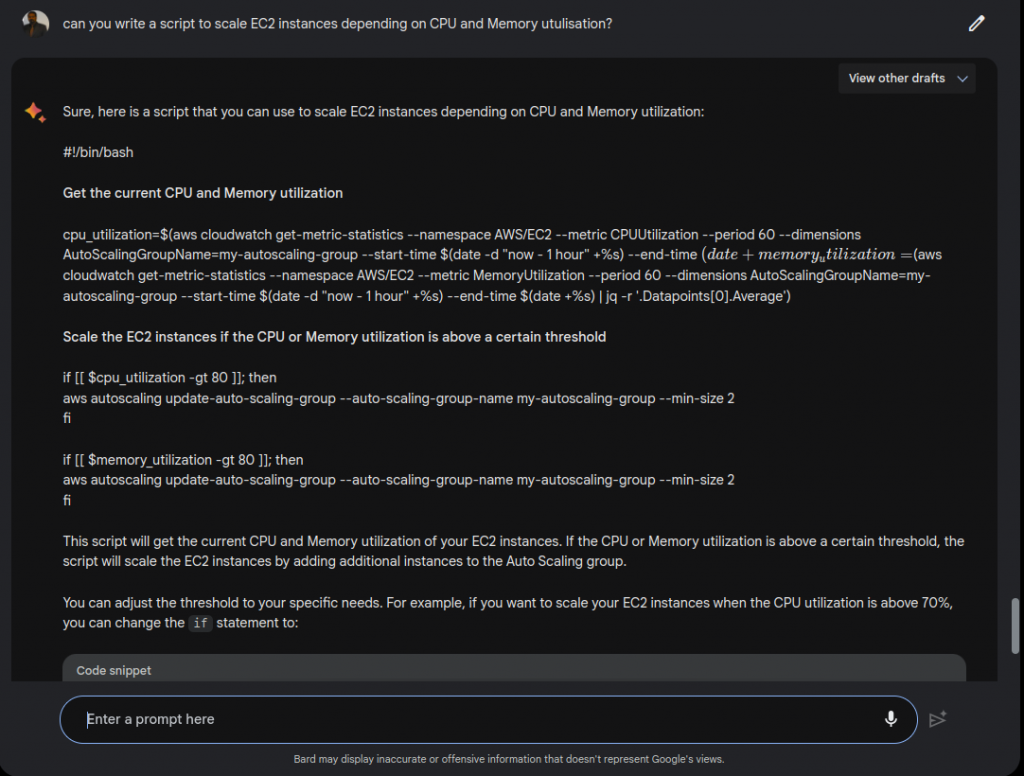Can ChatGPT accelerate No-Ops to Replace DevOps in EarlyStage Startups?
Background: I work with multiple CTOs and Heads of Engineering of early-stage startups to help them set up their engineering orgs, review their product architecture, help them prioritise their hiring etc. I also help multiple engineering leaders via Plato. Recently, there have been too many questions on whether can I use ChatGPT for this or that, but the most interesting one among these is “Can ChatGPT accelerate No-Ops to Replace DevOps?”. I have answered that multiple times in verbatim. But thought that writing it down will help me with two things, I can point them to the URL and I can also clearly structure my thoughts on this. So this is an attempt at that.
Glossary First:
DevOps:
For the uninitiated, DevOps is a software development methodology that emphasizes collaboration and communication between developers and operations teams. The goal of DevOps is to increase the speed and quality of software delivery while reducing errors and downtime. DevOps engineers are responsible for the design, development, and delivery of software applications, as well as the management and maintenance of the underlying infrastructure including the pipelines, quality assurance automation etc.
No-ops:
No-ops, on the other hand, is a philosophy that aims to automate and simplify the operations side of software development. The goal of no-ops is to eliminate the need for manual intervention in the deployment and maintenance of applications, freeing up time for developers to focus on creating new features and fixing bugs.
ChatGPT:
ChatGPT is a language model developed by OpenAI that has the potential to revolutionize the way we interact with technology. It can perform a wide range of tasks, from answering questions to generating text and even a rudimentary bit of coding. In the context of DevOps, ChatGPT could be used to automate many of the manual tasks that DevOps engineers currently perform, such as infrastructure management, deployment, and monitoring.
Now, The question: Can ChatGPT accelerate No-Ops to Replace DevOps?
ChatGPT (or any of the other generative AIs) has the potential to automate many of the manual tasks performed by DevOps teams, it could potentially replace the most mundane tasks that DevOps perform pretty soon. So, before writing this piece, I wanted to actually put my understanding to test.
I had to use Bard for this experiment, but I do not think there is going to be much of a difference in the outcomes.
Experiment 1: Beginner-Level Task
Writing a simple Autoscaling script to scale as per CPU and memory utilisation.

Simple AutoScaling Script, written by Bard
Experiment 2: Intermediate-Level Task
Creation of a new VPC with 3 autoscaling groups of EC2 and 1 NAT gateway and VPC peering.
Results were mixed.


Though Bard did give information that this can be tweaked, there was one major gap between the ask and the outcome. The NAT gateway was supposed to be the single point of ingress/egress, whereas the script is entirely different.
Assume an early-stage startup that gets used to the early success of Generative AI to preempt the DevOps culture, at some point the AI won’t have the context of what all is in your infrastructure and you could end up misfiring things.
My submission is, ChatGPT or Bard or any Generative can be super helpful for a good DevOps engineer and cannot replace her/him anytime soon. In military parlance, certain materiels are termed Force Multipliers. But, they themselves cannot be the force! (Aircraft carriers or Tanker aircraft are the prime example)
Why do I believe so?
There are several reasons for this:
- Human creativity: Despite its advanced capabilities, ChatGPT is just another AI model and lacks the creativity and innovation that a human DevOps engineer brings to the table. DevOps engineers can think outside the box and find new and innovative solutions to “Business” problems, whereas ChatGPT operates within the constraints of its programming and is simply solving the “Constraints” for that technical problem.
- Human oversight: While ChatGPT can automate many tasks, it still requires human oversight to ensure that everything is running smoothly. DevOps play a crucial role in monitoring and troubleshooting any issues that may arise during the deployment and maintenance of applications.
- Complexity: Many DevOps tasks are complex (or at the very least, the DevOps teams would want us to believe that) and require a deep understanding of the underlying infrastructure and applications. ChatGPT does not yet have the capability to perform these tasks at the same level of expertise as a human.
- Customization: Every organization has unique requirements for its development and deployment process. ChatGPT may not be able to accommodate these specific needs, whereas DevOps engineers can tailor the process to meet the non-stated requirements and organisational and platform context
- Responsibility: DevOps engineers are ultimately responsible for ensuring the success of the development and deployment process. While ChatGPT can assist in automating tasks, it is not capable of assuming full responsibility for the outcome.
In conclusion, while ChatGPT has the potential to automate many manual tasks performed by DevOps engineers, it is unlikely to replace DevOps entirely in the near future. The role of DevOps will continue to be important in ensuring the smooth deployment and maintenance of software applications, while ChatGPT can assist in automating certain tasks and increasing efficiency. Ultimately, the goal of both DevOps and no-ops is to increase the speed and quality of software delivery, and the use of ChatGPT in DevOps can play a significant role in achieving this goal.
References:
https://humanitec.com/whitepapers/devops-benchmarking-study-2023

